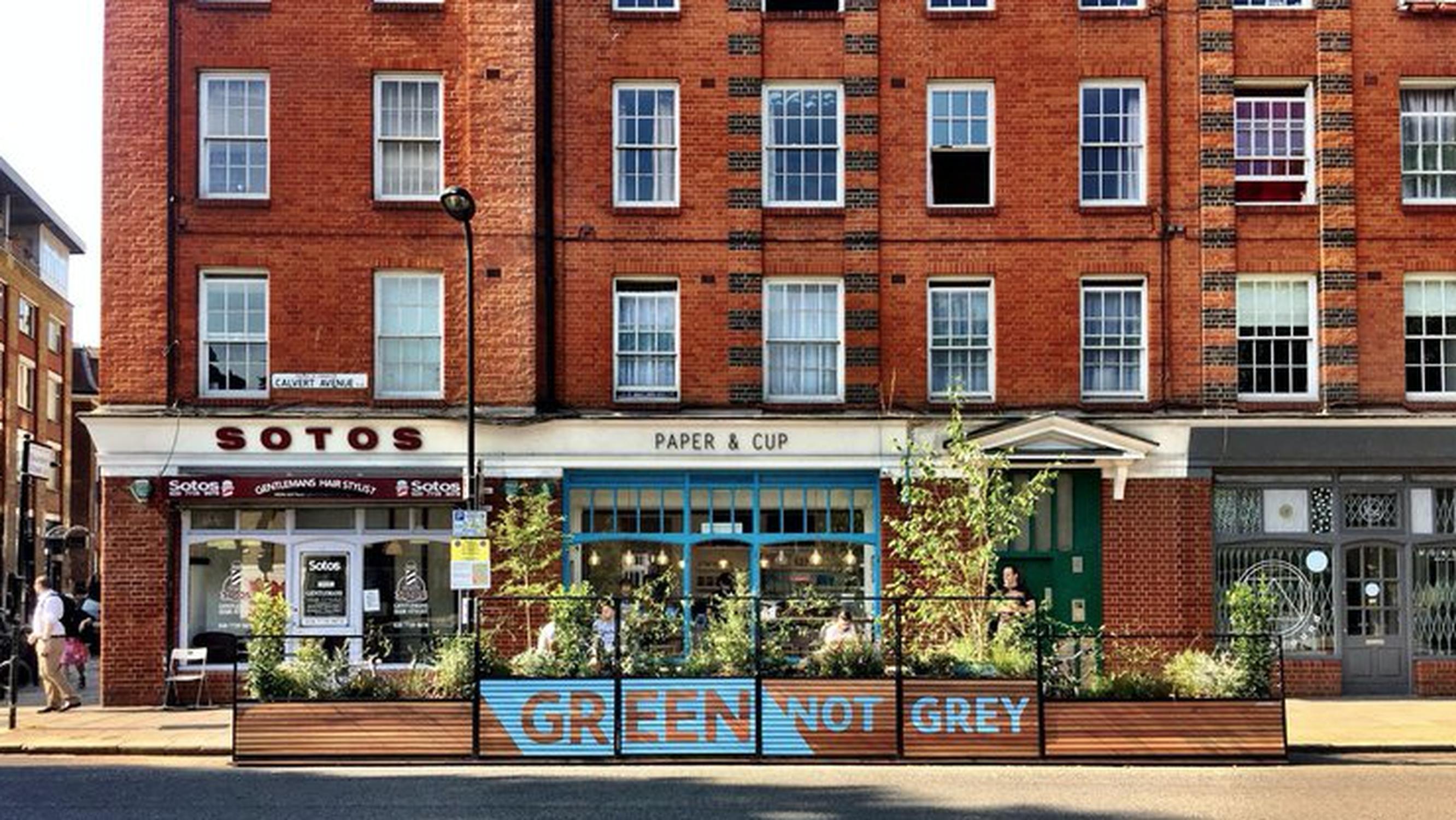

Parklets are the latest trend to hit our streets. Parklets are popping up on streets across the world. In the US there are over 3,000 of them, with Canada and Australia not far behind. Until recently, the UK’s the adoption of parklets has been painfully slow. However, in the past year more than 50 on-street parklets have been installed in London alone, with hundreds more in the pipeline. Parklets provide space for people to sit, relax and enjoy the city around them, providing aesthetic enhancement to the overall streetscape. Because they create space for people to pause and socialise, parklets could prove to the salvation for declining high streets.
What is a parklet?
Parklets are, typically, an extended platform over a parking space or pavement extension covering measuring one or two car parking bays. A parklet generally combines elements such as, but not limited to, benches, tables, chairs, landscaping, bike parking or lighting that reflect the character and needs of the location.
They offer an interesting public space for people to sit, relax and enjoy the city around them, while providing an aesthetic enhancement to the overall streetscape.
Parklets are an efficient way to provide an instant ‘pocket park’ and are classed as temporary measures as they can be moved very easily. Most parklets have a decked area that takes into account the camber of the road and level with the kerb so as to avoid a trip-hazard.
Many customers of bars and coffee shops enjoy the alfresco experience. Often pavements are very narrow, so extending the seating onto the carriageway seems perfectly sensible.
Doesn’t the loss of parking space have a negative impact on the neighbouring businesses?
No, actually all the evidence from UK and US shows businesses where parklets are located outside have shown a 20% to 30% uplift in revenue within the first 12 months. They help make local businesses look vibrant and provide seating that could attract potential customers.
Individual planting schemes are agreed upon a client’s requirements. Requirements may be different trees, plants and herbs, in relation to low maintenance, air pollution or drought resistance. Parklets are commonly located outside of businesses, providing facilities for their customers and local residents. Some parklets contain a variety of games for children, making them family-friendly spots.
What innovations are possible on parklets?
Parklets can be designed to have charging points and Wi-Fi incorporated into them, which makes sponsoring the parklet more attractive as users register to use the Wi-Fi.
A comprehensive maintenance package is available from the suppliers to keep the plants healthy. This includes: removal of dead leaves, any debris, plant feed, pruning and plant replacements (due to natural failures).
Who pays for parklets?
Presently, most funding is coming from public sources. In London the funding is from the Mayor’s office and complements the ‘Liveable Neighbourhoods’ programme, which is trying to improve air quality. Parklets are typically sponsored by private partner, but are free and open for any member of the public.
But, private sector funding is being made available from corporate sponsorship that can pay for building the parklet as well as the on-going maintenance. An example is the four parklets in Hammersmith, which were introduced by Hammersmith Business Improvement District (via the Mayor’s Fund) while one of the parklets was fully paid for by Medidata.
The National Licensing Authority is also working with businesses that wish to install a parklet outside their premises. They work with the local council to provide an annual license renewable each year (as is the case in the US, Canada and Australia).
Do parklets need planning permission?
No, not if they are on the carriageway, a traffic management order and change of use is required.
Do parklets attract anti-social behaviour?
You would expect them to, but parklets tend to be relatively trouble-free. The trick is to find a good location and involve the local business. It is a good idea to install notices about litter and smoking, and to have bins located next to the parklets.
Spreading the word
The word about parklets needs to be spread through marketing, council websites and through associations such as the National Licensing Association, which is connected to pubs, restaurants and clubs throughout London.
What else do we need?
A toolkit or parklet manual would help provide information on the application process, fees, responsibilities, design guidelines, and technical requirements, making it easier for clients to understand the full system. Additionally, a portal with location requests would also be beneficial, so people, businesses and local authority are able to recommend a location that needs a parklet. Lastly, clear engagement needs to take place through something like a Twitter parklet page that could contain feedback on the parklets installed.
Habib Khan is sales and marketing director of Meristem, an urban greening company.
TransportXtra is part of Landor LINKS
© 2025 TransportXtra | Landor LINKS Ltd | All Rights Reserved
Subscriptions, Magazines & Online Access Enquires
[Frequently Asked Questions]
Email: subs.ltt@landor.co.uk | Tel: +44 (0) 20 7091 7959
Shop & Accounts Enquires
Email: accounts@landor.co.uk | Tel: +44 (0) 20 7091 7855
Advertising Sales & Recruitment Enquires
Email: daniel@landor.co.uk | Tel: +44 (0) 20 7091 7861
Events & Conference Enquires
Email: conferences@landor.co.uk | Tel: +44 (0) 20 7091 7865
Press Releases & Editorial Enquires
Email: info@transportxtra.com | Tel: +44 (0) 20 7091 7875
Privacy Policy | Terms and Conditions | Advertise
Web design london by Brainiac Media 2020